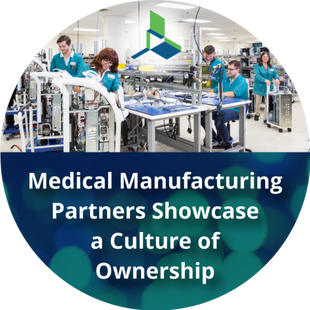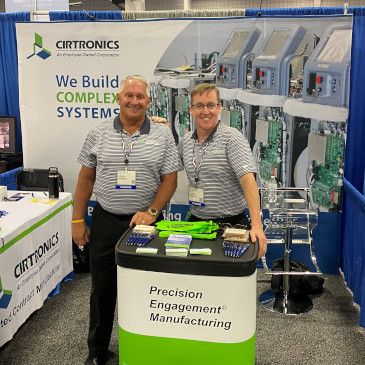
Contract manufacturers serving their customers focus on seamless project evolution from design reviews to production, testing, aftermarket support, and fulfillment. Each step is specifically tailored to meet the needs of each product and requirement. So how does that happen exactly? A medical device company goes through its FDA process or clinical trials, obtains approval, and orders start. How and why would they outsource to someone without tribal knowledge? The reason lies in having a dedicated resource with expertise in documentation and proven processes.
Medical device contract manufacturing requires precise attention to detail. Each customer has different needs, which is exactly why a manufacturer’s culture of ownership and customer-focused service matters. These highly complex device projects should never be forced to fit into pre-defined programs and processes. Instead, services should be tailored to support the goals of each customer and project. Attention to detail and dedication to customer satisfaction should be ingrained in the contract manufacturer’s culture and evident in every interaction, from sales to fulfillment.
Partnering with a contract manufacturer (CM) should never be based solely on their current physical capabilities. They must be flexible and intentional in their efforts to cross-train staff to develop a level of agility that enables the team to shift personnel to handle changes in demand. A good CM will constantly be growing – adding capital equipment, expanding training, increasing staff, and more. While manufacturing new products for existing customers, they will also be forging new client relationships across the medical technology market and tailoring offerings to fit each of their specific needs.
All contract manufacturers can build and provide products. However, it is those CMs that both invest each year in the latest capital equipment and technology AND that focus on serving their customers that truly succeed. They must work with each client to understand their needs and to fully grasp what it is they are looking for and what needs to be delivered before taking on any purchase orders, as medical device manufacturing projects carry unique requirements, including regulatory compliance, risk management, multi-disciplinary development, and technical engineering.
The level of customization and the extensive discussion needed before starting actual manufacturing is relatively uncommon in the industry. However, medical technology companies are becoming more aware of this and therefore becoming more selective when choosing their CM partners.
There is no one size fits all — companies at different stages in their product development have different requirements, although the levels of quality and customer support needed remain high. Similarly, just because a contract manufacturer offers ten different services doesn’t mean that each one needs to be used. A more selective program should be created to suit each customer’s unique needs, with the understanding that as their needs change, changes need to be made to support them. A CM needs to be as responsive and proactive as possible so that the customer’s experience is supportive, positive, and accessible. Understanding these more human elements is what differentiates a CM from the rest.
Transparency is another differentiator. With life-sustaining and critical care devices, documentation control and traceability are imperative. From production orders and device history records (DHR) down to the component level, everything needs to be aligned with market/regulatory requirements to ensure containment and mitigate recall risks. This information should be readily available and communicated between a medical device customer and their CM.
A CM’s transparency should also extend internally in sharing daily information about shipments and sales to all employees. They should be able to discuss new customers, quality, and delivery details with their team. The internal staff should always know where the company is regarding processing, shipping, delivery, and financial stability. The more people are kept informed, the more motivated they are. Being transparent is a crucial motivator – if someone can see a goal, believe in it, and see where they are, then they can feel empowered to make extra efforts necessary to reach it.
This is where the fundamental idea of a “Culture of Ownership” comes into play. An engaged workforce truly believes in its mission of customer service. They understand that their customer’s success is directly tied to their company’s success, and therefore are more motivated to deliver on the promise of true partnership. Each customer should be treated as unique and have solutions be built cooperatively to best serve their requirements. Dedication to customer-focused service, combined with purposeful, proactive communication is critical in medical device and instrumentation production, where the end results affect lives, health, and well-being. Medical device companies should have the comfort of knowing their CM partner truly understands their needs and is motivated and working diligently for their success. Learn more about working with a medical device contract manufacturer by visiting cirtronics.com/market/medical-and-life-sciences/.
About Cirtronics
Cirtronics is a great choice for customers looking to build a strategic, interdependent, collaborative relationship with their contract manufacturer. Founded in 1979 in Milford, New Hampshire by Gerardine Ferlins, Cirtronics’ foundation is built on the idea that each individual holds unique potential. The organization’s role is to identify and develop that potential through ongoing collaboration and engagement. The company’s mission is to serve and continually improve under its DUO (Do Unto Others) philosophy. DUO is practiced in every interaction with each of the “6 We Serve”: Customer, Corporation, Employee, Supplier, Environment and Community.
Since 2002, Cirtronics has offered an Employee Stock Ownership Program (ESOP), now at 40 percent ownership. Cirtronics’ culture of ownership runs through all aspects of the organization, extending from relationships with suppliers through shipping of every single product. Employee-owners are direct stakeholders who recognize the customer as an extension of their own business. Dedicated to positive outcomes and proactive engagement, employees bring their best to every interaction with customers and to every decision impacting the company infrastructure and offerings. Additionally, Cirtronics is ISO 9001 and ISO 13485 certified, as well as FDA registered.


